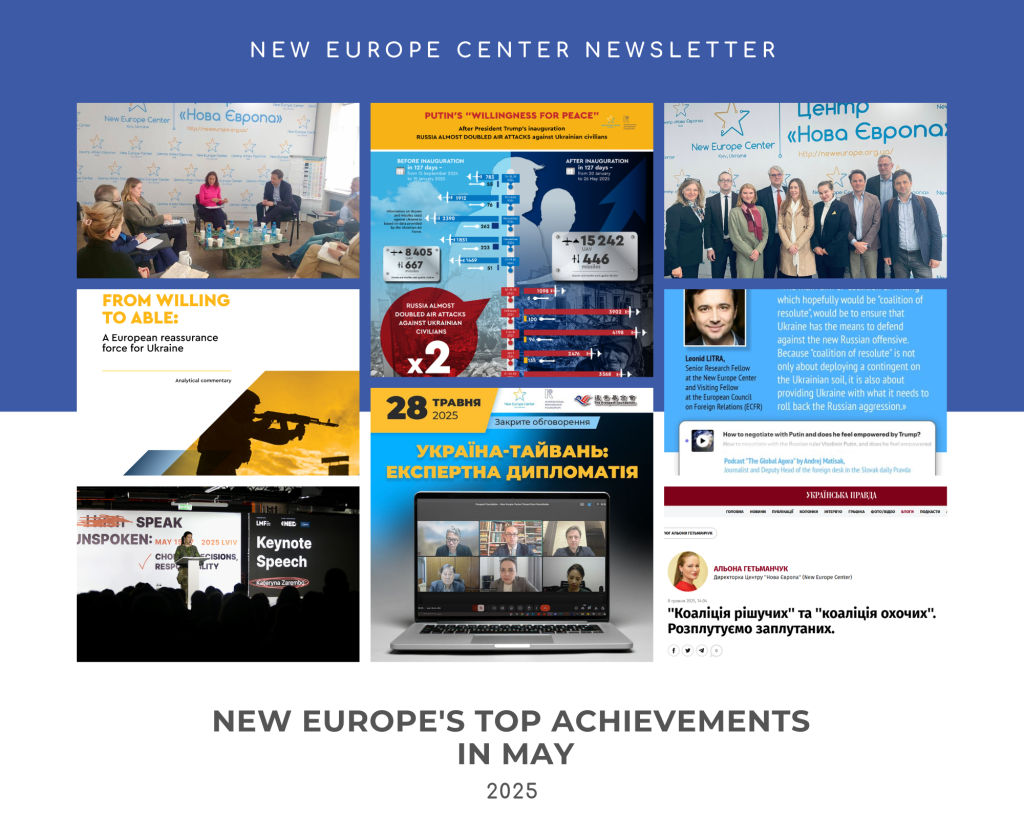European elections are in full swing, being tense and unpredictable. Regardless of whether anti-European parties increase the share of EP seats, the battle of ideas seems to reshape Europe’s political landscape for years to come. Therefore, it is very important for Europeans and Ukrainians as well as to understand what will be the challenges after these elections and how to cope with them. With this in mind, the New Europe Centercontacted well-known researchers with the following question: What challenges will face Europe and, in particular, Ukraine, after the elections to the European Parliament and how to deal with them?
Pdf-copy of the document you can find here.
Leo Litra, Senior Researcher, New Europe Center
European Parliament is expected to change after the 2019 elections. The rise of the populist and far-right parties and their greater representation in the next iteration of the parliament will pose several risks. Above all, it is about the increasing fragmentation of the parliament and lack of cohesion in many policy areas important for the EU. Likewise, the divisions in the parliament and a more “vocal” opposition towards EU will affect Brussel’s policy on the Eastern Partnership countries, including Ukraine. This means the topic of Ukraine could become more divisive and the decisions which will affect EU-Ukraine relations are likely to get less support or become fuzzier as a result of the compromise and trade-off for the sake of ensuring the ability of the parliament to adopt decisions.
Yet, the Ukraine-friendly political groups, despite their falling trend, will likely form the majority in the next parliament. Some Ukraine-friendly political groups such as EPP and S&D are to get fewer seats in the new parliament. However, the loss in mandates of EPP and S&D will be partly replaced by the likely rise of such political groups as ALDE and Greens. Therefore, Ukraine may count on the support of political groups such as EPP, S&D, ALDE, Greens/EFA, ECR, etc which would advance the bilateral cooperation. Still, the support is not for granted and Ukraine will have to show commitment to Association Agreement and consistency in implementing reforms.
Giuliano Bifolchi, University of Rome Tor Vergata – Department of History, Cultural Heritage, Education and Society, Co-founder of Association of Studies, Research and Internationalization in Eurasia and Africa (ASRIE)(Italy)
“The coming elections might represent the beginning of internal political disintegration whether the anti-European parties will get more seats inside the EU Parliament. The main challenges after the elections might be disunity and the absence of a common strategy to control Europe’s territory, defend its citizens from violent attacks and ideological propaganda and manage a multicultural society in a historical period characterised by political confrontation, radicalisation, migration flow and economic crisis.
A weak European Parliament with an internal disagreement might undermine the Eastern Partnership and allow the abolition of the sanctions on Russia, as requested by some EU members to recover the commercial trade. The restoration of the commercial relations between Brussels and Moscow might harshly interest the future of Ukraine which can definitely lose Crimea and the Eastern Ukraine and also the EU support in its democratic process with serious repercussions on its national politics and economy.
On the one hand, to overcome the future challenges the EU needs to start a reform process that will reduce the distance between the EU citizens and their politicians inside the parliament. In fact, the anti-European parties have exploited Brussels’ lack of communication to promote their own political agenda using in many occasions the Ukrainian crisis to criticise the Eastern Partnership and the EU support on Ukraine described as an economic burden hard to shoulder.
On the other hand, Kiev should become less dependent on European support in politics and economy seeking new potential international partners and getting involved in different economic projects (i.e. the Belt and Road Initiative) to diminish the possible negative effects of the EU Parliamentary elections.”
Сhristine Dugoin, PhD Searcher IAE of Paris – Sorbonne Paris 1, Analyst of CapEurope (France)
Many analysts in France are afraid of both a high rate of abstention and good scores for eurosceptic from far right. Abstention and the actual context may mechanically strengthen the numbers of radicals in Bruxelles. It would allow to see a group of nationalist anti-European political parties advocating a return to a “Europe of the nations” win a controlling share of seats in the European Parliament ( EP).
Concerning Ukraine, if these fears become reality, many subjects of interest may suffer from a lack of decisions for an increase of the right wing at the parliament may generate a « by passing effect ». In practice, if the eurosceptics gain a controlling share of seats, European Parliament may be tempted to avoid treating some sensitive subjects for diferent reasons. The first reason would be the results that may emerge on thesetopics. Second reason would be that working on these subjects will force to share sensitive information with the radicals, perceived as not trustable and even dangerous for the EU stability.
This prudential supervision may have a deleterious effect for Ukraine. Indeed, many subjects may not be treated, letting Ukraine without sufficient support and without a clear vision of European expectation for Ukraine, increasing the “European fatigue”.
Consequently the ability of the anti-Europeans to freeze decision-making of the EU would discredit the pro-European rhetoricthat if the project is imperfectnow, it may be improvedand is worth beingsupported.
Moreover, even if anti European parties are quite divided on substance, they could have tactically common position concerning some issues, including abolishment or weakening of sanctions on Russia. Thiskind of position may decrease EU capacity to show determinationand leadership necessary to increase cooperation and to stay a credible interlocutor to Russia.
Jos Boonstra, Senior Researcher, Centre for European Security Studies, EUCAM coordinator (Netherlands)
A Dutch viewpoint
Whereas the Dutch seem to be slightly more positive about the European Union (about half is positive), possibly as a result of economic growth, there is little attention to the upcoming European elections. It is difficult to find information about the candidates while broadcast, online and written media report on the election debates without much depth or genuine interest. One reason for this is that the Netherlands had provincial and water council elections last March and might suffer from election-fatigue. The provincial elections were won by a fairly new right wing populist party: Forum for Democracy is now a political force to reckon with (and was developed out of a think tank that was one of the initiators of the Dutch referendum on the EU Association Agreement with Ukraine back in 2016). The Dutch prime-minister Mark Rutte (a rightwing liberal) has challenged the leader ofForum for Democracy, Thierry Baudet, to a debate on the eve of the elections arguing that Baudet’s ‘nexit’ rhetoric is dangerous for the future of the Netherlands. The European Parliament elections and later the instalment of a new Commission in autumn are important to all European countries, including Ukraine. The challenges are obvious, from brexit to enlargement with Western Balkan countries to countering anti-democratic tendencies in Hungary and Poland to making strides in energy transition. For Ukraine it will be important to make further headway under its new president and Verkhovna Rada with implementation of the Association Agreement and subsequent DCFTA trade agreement: Ukraine’s so to deepen economic ties with the EU with a view to prosperity for Ukrainians. Membership will remain a distant prospect but deepened relations and development are not.







